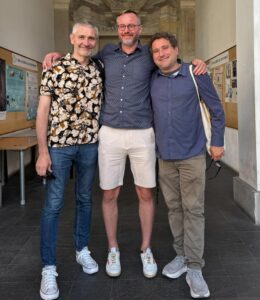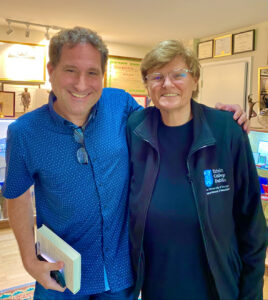
Associate Professor, Psychology Graduate Program Director
(A.B., A.M., Ph.D., The University of Chicago; Post-doc, University of Michigan, Institute for Social Research)
Office: Armitage Hall Room 345, Rutgers-Camden, 311 N. 5th St., Camden NJ 08102
Email: seduffy@scarletmail.rutgers.edu
Office phone: (856) 225-6204 (but email is better)
Research Areas: Memory, learning, and decision making; culture and thought; environmental psychology; spatial reasoning and development. Also interested in psychology of art and music; culture and food, and crowd behaviors.
(Pictured here (left) with Parisian friend Blini…a very fine cat!)
Spring 2025 International Studies Course (Paris) Psychology and neuroscience of urbanism. Here is the brochure (come visit Paris with me!). I’ll probably do this again in a year (2027) so keep your eyes open if you want to hang out in Paris and learn about psychology and urbanism.
RESEARCH TEAM: Lab website / The Camden Decision Lab Members and Collaborators (and pets)
RECENT COURSES:
Fall 2024: Graduate Statistics; Cognition, Neuroscience, and Cinema
Winter, 2025: Cultural Psychology of Food
Spring 2025: International Studies course, Readings in Psychology
Summer 2025: Cultural Psychology of Food, Method and Theory
Fall 2025: Graduate Research Methods, Readings in Psychology
Winter 2026: Environmental Psychology (UG)
Spring 2026: Statistics for Social Sciences (UG), Readings in Psychology (G)
MUSIC PAGE:
Please click here my carillon (cathedral/church bell) music page! For a number of years I played the largest musical instrument ever designed and built, and wrote some free sheet music for it so you can play it too!
THINGS I AM CURRENTLY WORKING ON OR THINKING ABOUT:
Memory and learning: How we make sense and meaning of a world we imperfectly perceive? (with J. Smith)
Social psychology: How does automatic Imitation work and what role does it play in dynamic interaction? (with C. Bouquet and R. van Der Wel)
Environmentalism: How do people think about renewable energy, such as offshore wind?
Cultural psychology and mental health in three continents (with G. Navarro Baene and G. Cabarcas)
Psychology of Humor (with M. Mutunga, N. Hansen, and C. Bouquet)
Culture, psychology, and food (the basis for my course The Cultural Psychology of Food)
Psychology of art, music and photography (the basis for my course The Psychology of Art and Music)
Crowd movements: A new research area with mathematician B. Piccoli and R. van Der Wel
WORKING PAPERS:
Please see John Smith’s site for several other works in progress or under review and supplementary materials.
Mutunga, M., Hanson, N., Bouquet, C., & Duffy, S. (in preparation). Gender effects on the perception of humor.
Hanson, N., Mutunga, M., Bouquet, C., & Duffy, S. (in preparation). Sexual orientation affects perception of humorous individuals.
McGovern, E., Mutunga, M., Hanson, N., Bouquet, C., & Duffy, S. (in preparation). Experimental investigation on gender’s role moderating humor preferences.
Hackenberry, I., De Leon, Z., & Duffy, S. (in preparation). Knowledge of Artificial Intelligence stimuli affects memory for information.
De Leon, Z., Hackenberry, I., & Duffy, S. (in preparation). Knowledge of Artificial Intelligence stimuli affects persuasiveness of messages.
Duffy, S., Hackenberry, I., & Smith J. (in preparation). Do categories affect stimulus estimates?
Nguyen, C., Duffy, S., & Smith, J. Signal Detection Theory has a learning problem (a poster presentation)
Cabarcas, G., Kier, A., & Duffy, S. (in preparation). Public opinions of offshore wind energy in New Jersey.
Navarro Baene, G., Cabarcas, G., & Duffy, S. (in preparation). Validating and replicating the Positive Mental Health Scale in a U.S. sample.
Duffy, S., & Smith, J. (In preparation). Signal detection theory’s learning problem
Hartranft, C., Pagan, J., Duffy, S., Krassner, M, Duffy, K., Wisniewski, K., and Auguste, A. (in preparation). A century of smiles: Changes in emotional expression in portrait photography 1920-2020.
RECENT PAPERS (older papers at my google scholar page):
Khizar, A., Piccoli, B., Duffy, S., & Pompili, D. (submitted) Leveraging on-board UAV motion estimation for lightweight macroscopic crowd identification.
Duffy, S., & Smith, J. (submitted). The random thickness of indifference.
Duffy, S., & Smith, J. (2025). An economist and a psychologist form a line: What can imperfect perception of line length tell us about stochastic choice. Theory and Decision, 99, 701-734.
Duffy, S., & Smith, J. (2025). Stochastic choice and imperfect perception of line lengths: What is hiding in the noise? Journal of Economic Psychology, 106: 102787.
Bouquet, C., van der Wel, R., Lafleur, M., & Duffy, S. (2025) Regulation of automatic imitation: Domain specific versus domain general control processes. Journal of Experimental Psychology: Human Perception and Performance, 51, 32-49.
Duffy, S., Nadeo, J.J., Owens, D., & Smith, J. (2024). Cognitive Load and Mixed Strategies: On brains and minimax. International Game Theory Review, 26(3), 2450004.
Duffy, S., Hertel, J., Igan, D., Pinhiero, M., & Smith, J. (2022) Bayesian integration in sensorimotor learning: Another look at Kording and Wolpert (2004). Cortex, 153, 87-96.
Duffy, S., Gussman, S.,& Smith, J. (2021). Visual judgments of length in the economics laboratory: Are there brains in stochastic choice? Journalof Behavioral and Experimental Economics, 93,163-193.
Duffy, S., & Smith, J. (2020). On the category adjustment model: Another look at Huttenlocher, Hedges, and Vevea (2000). Mind and Society, 19, 163-193.
Duffy, S., & Smith, J. (2020). Omitted-variable bias and other matters in the defense of the category adjustment model: A comment on Crawford (2019). Journal of Behavioral and Experimental Economics, 85: 101501.
Duffy, S., & Smith, J. (2018). Category effects on stimulus estimation: Shifting and skewed frequency distributions-A reexamination. Psychonomic Bulletin and Review, 25, 1740-1750.
Duffy, S. (2017). Cognitive development. In K. Nadal (Ed.) The Sage Encyclopedia of Psychology and Gender. (pp. 306-309). Thousand Oaks, CA: Sage Publications.
Jonas, K. J., Cesario, J., Alger, M., Bailey, A. H., et al. (2017). Power poses – where do we stand?, Comprehensive Results in Social Psychology, 2, 139-141.
Latu, I. M., Duffy, S., Pardal, V. & Alger M. (2017). Power vs. persuasion: Can open body postures embody openness to persuasion? Comprehensive Results in Social Psychology, 2, 68-80.
Allred, S., Crawford, L.E., Duffy, S. & Smith, J. (2016) Working memory and spatial judgments: Cognitive load increases the central tendency bias. Psychonomic Bulletin and Review, 23, 1825-1831.
Allred, S., Duffy, S., & Smith, J. (2016). Cognitive load and strategic sophistication. Journal of Economic Behavior & Organization, 125, 162-178.
Duffy, S., Smith, J., & Woods, K. (2015). How does the preference for increasing payments depend on the size and source of the payments? Management Science Letters, 5, 1071-1080.
Duffy, S. & Smith, J. (2014). Cognitive load in the multiple player prisoner’s dilemma game: Are there brains in games?.Journal of Behavioral and Experimental Economics, 51, 47-56.
Duffy, S., Hartwig, T., & Smith, J. (2014). Costly and discrete communication: An experimental investigation. Theory and Decision, 76, 395-415.
Duffy, S. & Smith, J. (2013). Preference for increasing wages: How do people value various streams of income? Judgment and Decision Making, 8, 74-90.
See my Google Scholar page for links to all published articles.
Letters of Recommendation: Read this if you are looking for a letter of recommendation.
Interested in doing an independent study in my lab? Click here for the application.
Other cool things:
Meeting Nobel Laureate Katalin Karikó

Recently, I had an unbelievable opportunity to meet a scientific hero of mine, Dr. Katalin Karikó, awarded the 2023 Nobel Prize in Medicine. Dr. Karikó’s research on the therapeutic use of mRNA led to effective vaccines against COVID during the pandemic, saving millions of lives. If you remember having had the Moderna or Pfizer vaccine – that was the result of many years of her painstaking effort to harness the power of transcribed mRNA.
Dr. Karikó’s memoir Breaking Through: My Life in Science is a must-read for anyone at any point in their scientific career. It describes her journey from her childhood in Hungary to her experience with academic culture in the United States. When I first read it, I went from cover to cover in one sitting, it is such a compelling story of a remarkable scientific career. The book should be on every scientist’s shelf.
There are also two children’s books written about her life and achievements: Never Give Up: The race for the future of vaccines, and Kati’s Tiny Messengers: Dr. Katalin Karikó and the battle against COVID-19.
It’s just amazing what great scientists like Dr. Kariko can accomplish, and I am always in awe of all those involved in this endeavor.
Some conference pictures of colleagues and friends:
John Smith and I at Saint Mark’s Plaza in Venice, Italy at the conclusion of the Bounded Rationality in Choice Conference in Venice, Italy, June, 2024. Cedric Bouquet, Robrecht van Der Wel and I at the Joint Action Meeting in Turin, Italy in July 2025. This was the first time three of us were ever in the same room even though we had just published a paper together! Benedetto Piccoli, Robrecht, and I walking the grounds at the Institute for Advanced Study in Princeton in 2024.



Get to know Camden New Jersey – it is beautiful here! I made this Timelapse for you to enjoy.
